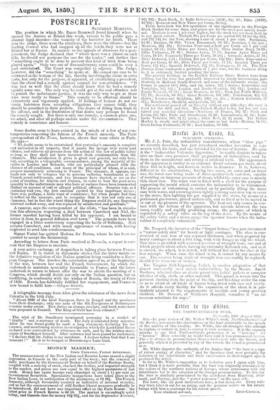POSTSCRIPT.
SATTTB,DAY MORNING.
The position in which Mr. Baron Bramwell found himself when he opened the Assizes at Bristol this week, reveals to the public gaze a chronic legal disorder—the voracity of the barrister for briefs. There was the judge, there were the attorneys, there were the clients—but the leading counsel who had snapped up all the briefs, they were not at Bristol but at Exeter. In answer to the appeals of attorneys for a post- ponement, the Judge declared that "where there was a junior on each side, he should not postpone the ease for the leader," and further that "something ought to be done to prevent this kind of trick from being played again." Only two out of five-and-twenty cases could be even a part entertained. The Court was compelled to adjourn. The Judge, however, did the "something" he spoke of. He caused one case to be reentered at the bottom of the list, thereby involving the client in extra costs, but only for the purpose, it appeared, of establishing a precedent, that the client had a remedy against counsel for non-attendance. "It was just as well that the client should know that he had a remedy against some one. The only way he could get at the real offenders was to punish the unfortunate parties ; it was the only way to get at those who were really to blame." This remedy to be effectual should be extensively and vigorously applied. If feelings of honour do not re- strain barristers from accepting obligations they cannot fulfil, they should be punished in their pockets. The desire of filling them leads to the offence, and in the frustration of that desire may perhaps be found the remedy sought. But there is only one remedy, a common place one, we admit, and after all perhaps useless under the circumstances. That remedy is conscience and honour.


























 Previous page
Previous page